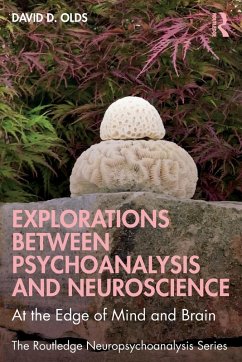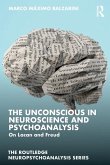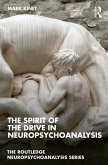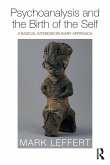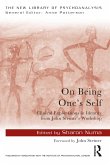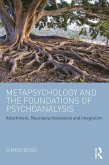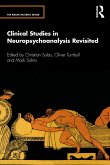Explorations Between Psychoanalysis and Neuroscience brings together the life's work of David Olds, pioneering psychoanalyst, psychiatrist, philosopher, and key figure in neuropsychoanalysis.
Throughout the chapters, the reader is taken on a journey through Olds' theories on psychoanalysis and neuroscience as he develops new ways of examining the brain and human thought. Olds instills in the reader the importance of taking an interdisciplinary approach to psychoanalysis, psychiatry and working with patients. He expands upon his philosophical background and integrates evolutionary biology, neurobiology, cognitive science and semiotics to show the importance of dual aspect monism in neuropsychoanalysis. The theories developed by Olds and presented in this volume will help analysts working with patients facing issues with memory, affect, consciousness, cognition and trauma, among other difficulties.
This book will be essential reading to psychoanalysts and psychiatrists, as well as anybody interested in neuropsychoanalysis and the importance of an interdisciplinary approach to analytic thinking and practice.
Throughout the chapters, the reader is taken on a journey through Olds' theories on psychoanalysis and neuroscience as he develops new ways of examining the brain and human thought. Olds instills in the reader the importance of taking an interdisciplinary approach to psychoanalysis, psychiatry and working with patients. He expands upon his philosophical background and integrates evolutionary biology, neurobiology, cognitive science and semiotics to show the importance of dual aspect monism in neuropsychoanalysis. The theories developed by Olds and presented in this volume will help analysts working with patients facing issues with memory, affect, consciousness, cognition and trauma, among other difficulties.
This book will be essential reading to psychoanalysts and psychiatrists, as well as anybody interested in neuropsychoanalysis and the importance of an interdisciplinary approach to analytic thinking and practice.
"This series of articles traces David Olds' personal journey to integrate neuroscience findings into psychoanalytic practice, contributing insights into our profession's realization of Freud's goal to unite brain and mind into a scientific psychology."
Bonnie Litowitz, Former Editor of JAPA
"At last, David Olds' papers collected in one volume with his recent thoughts. Olds, a pioneer in the area of mind and brain relations, is a deep thinking psychoanalyst who here gathers his important contributions to the neurology of the mind including his seminal work in semiotics. He brings to neurology the complexity of psychoanalytic thinking and observations, and he brings basic science to psychoanalysis. He reviews the past 50 years of progress in this area, and in his own work, bringing it up-to-date in a beautifully written summary book. This is a foundational text for understanding neuro- psychoanalysis. It is the perfect text for any course attempting to teach complex, integrated models of mental functioning."
Eric Marcus, Former Director of the Columbia Psychoanalytic Center, and the author of Psychosis and Near Psychosis: Ego Function, Symbol Structure, Treatment: and Modern Ego Psychology and Human Sexual Experience: the Meaning of Treatment
"The mind-body problem represents a challenging topic in science. While no attempt at solving it can be simple, the position taken by David Olds in his book is that of exploring the problem and finding ways to integrate knowledge from multiple sources. Identifying common properties to different perspectives is one of Olds' finest skills. The chapters of his book were originally published as articles in relevant journals that witness the evolution of his outstanding thinking. Olds creatively resorts to fields such as semiotics to find a common language between biology and psychoanalysis using the sign as its most basic concept. This remarkable collection of papers addresses much of what would later be explored in the field of neuropsychoanalysis, including his observations of consciousness, affect, and defense, as well as clinical implications. His pioneering work is a must-read for anyone interested in complex models of the Brain-Mind."
Daniela Flores Mosri, Current Managing Editor of the journal: Neuropsychoanalysis.
"Although, as Olds notes, understanding how the mind and brain work inevitably has implications for psychoanalytic clinical work, I think Freud was right in stating that psychoanalysis' main claim on posterity lies in its account of how the mind functions. However, for psychoanalysis to productively carry out this project, it must interact with and integrate findings from other disciplines (and other disciplines would do well to integrate findings from psychoanalysis). David Olds is one of the relatively small number of psychoanalysts who, in taking Freud's claim seriously, has devoted much of his professional career to enhancing the psychoanalytic understanding of the functioning of the mind through critical knowledge and thinking about insights and discoveries from other disciplines. Olds' book provides the reader, in one place, a tour of developments in semiotics, neuroscience, philosophy of mind, systems theory, and theories of consciousness that are relevant to any theory of mind, including a psychoanalytic one. It offers the reader a rich experience of a psychoanalyst who has given deep thought to fundamental questions regarding the nature of mind and what it means to be human."
Morris N. Eagle, Psychoanalyst and theoretician, with recent publication of the book, Subjective Experience: Its Fate in Psychology, Psychoanalysis and Philosophy of Mind.
Bonnie Litowitz, Former Editor of JAPA
"At last, David Olds' papers collected in one volume with his recent thoughts. Olds, a pioneer in the area of mind and brain relations, is a deep thinking psychoanalyst who here gathers his important contributions to the neurology of the mind including his seminal work in semiotics. He brings to neurology the complexity of psychoanalytic thinking and observations, and he brings basic science to psychoanalysis. He reviews the past 50 years of progress in this area, and in his own work, bringing it up-to-date in a beautifully written summary book. This is a foundational text for understanding neuro- psychoanalysis. It is the perfect text for any course attempting to teach complex, integrated models of mental functioning."
Eric Marcus, Former Director of the Columbia Psychoanalytic Center, and the author of Psychosis and Near Psychosis: Ego Function, Symbol Structure, Treatment: and Modern Ego Psychology and Human Sexual Experience: the Meaning of Treatment
"The mind-body problem represents a challenging topic in science. While no attempt at solving it can be simple, the position taken by David Olds in his book is that of exploring the problem and finding ways to integrate knowledge from multiple sources. Identifying common properties to different perspectives is one of Olds' finest skills. The chapters of his book were originally published as articles in relevant journals that witness the evolution of his outstanding thinking. Olds creatively resorts to fields such as semiotics to find a common language between biology and psychoanalysis using the sign as its most basic concept. This remarkable collection of papers addresses much of what would later be explored in the field of neuropsychoanalysis, including his observations of consciousness, affect, and defense, as well as clinical implications. His pioneering work is a must-read for anyone interested in complex models of the Brain-Mind."
Daniela Flores Mosri, Current Managing Editor of the journal: Neuropsychoanalysis.
"Although, as Olds notes, understanding how the mind and brain work inevitably has implications for psychoanalytic clinical work, I think Freud was right in stating that psychoanalysis' main claim on posterity lies in its account of how the mind functions. However, for psychoanalysis to productively carry out this project, it must interact with and integrate findings from other disciplines (and other disciplines would do well to integrate findings from psychoanalysis). David Olds is one of the relatively small number of psychoanalysts who, in taking Freud's claim seriously, has devoted much of his professional career to enhancing the psychoanalytic understanding of the functioning of the mind through critical knowledge and thinking about insights and discoveries from other disciplines. Olds' book provides the reader, in one place, a tour of developments in semiotics, neuroscience, philosophy of mind, systems theory, and theories of consciousness that are relevant to any theory of mind, including a psychoanalytic one. It offers the reader a rich experience of a psychoanalyst who has given deep thought to fundamental questions regarding the nature of mind and what it means to be human."
Morris N. Eagle, Psychoanalyst and theoretician, with recent publication of the book, Subjective Experience: Its Fate in Psychology, Psychoanalysis and Philosophy of Mind.

